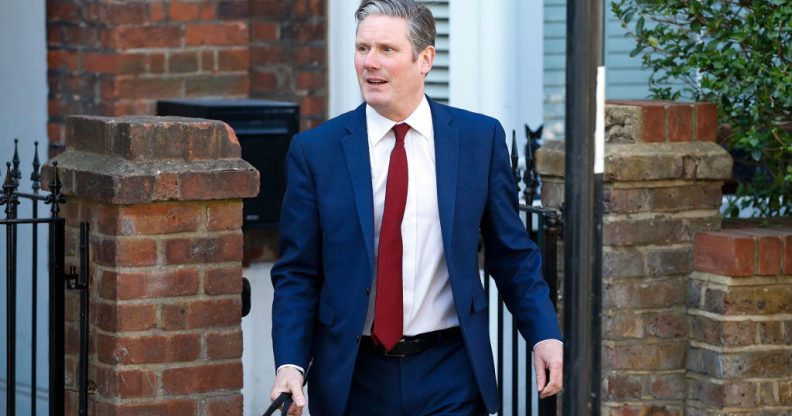This is how Labour leader Keir Starmer’s new shadow cabinet voted on LGBT+ rights

New Labour leader, Sir Keir Starmer leaves his home on April 4, 2020. (Photo by Hollie Adams/Getty Images)
New Labour leader Sir Keir Starmer has appointed a top team that’s packed with strong supporters of LGBT+ rights.
The leader appointed Marsha de Cordova as his new shadow women and equalities secretary, taking over responsibility for LGBT+ issues from the departing Dawn Butler.
The incoming shadow minister has said it will be an “honour” to carry on the “important work” done by Butler in the brief.
Of the 31 shadow ministers in the team, five publicly identify as LGB – shadow environment secretary Luke Pollard, shadow local government secretary Steve Reed, shadow Wales secretary Nia Griffith, shadow minister for young people Cat Smith and chief whip Nick Brown.
This contrasts to Boris Johnson’s cabinet, which currently has no out LGBT+ ministers at all.
Keir Starmer and his shadow cabinet are overwhelmingly pro-LGBT+.
There is a strong record of support for equality in the new shadow cabinet.
Not a single member of Starmer’s new top team opposed LGBT+ rights in either of the two most recent bellwether votes – the introduction of same-sex marriage in England and Wales in 2013, and the extension of the law to Northern Ireland in 2019.
15 shadow cabinet ministers were MPs in 2013, of which all 15 voted in favour of marriage equality in England and Wales.
Of the 29 who were MPs in 2019, 27 voted in favour of equality for Northern Ireland – with only Ed Miliband and David Lammy, both strong supporters of LGBT+ rights, absent from parliament during the vote.
By contrast, nine of Boris Johnson’s 26 cabinet ministers have voted against marriage equality on at least one occasion, and 17 ministers including Mr Johnson himself abstained in the Northern Ireland vote.
Support for trans rights, too.
The voting record of MPs does not reflect their stance on transgender rights, as there has not been a significant vote on trans issues for more than a decade.
However, many members of the shadow cabinet – including Starmer, shadow business secretary Ed Miliband, shadow foreign secretary Lisa Nandy and shadow trade secretary Emily Thornberry – have publicly backed gender recognition reforms.
The new Labour leader wrote an essay for PinkNews back in February, explaining how LBGT+ rights would be at the core of his Labour Party.
In it, he underlined his support for reforms to the Gender Recognition Act (GRA), which he said must be overhauled to better support the trans community.
“Trans rights are human rights,” he wrote. “Though the Gender Recognition Act was an important advance, it is clear that more needs to be done.
“We need to reform the GRA to include self-identification and legal recognition of non-binary gender identities.”


